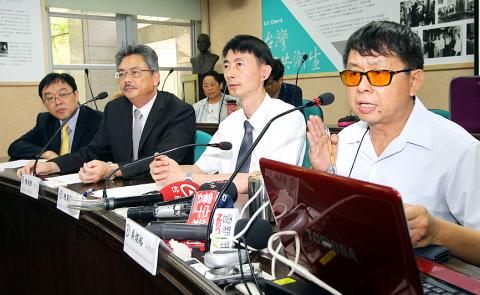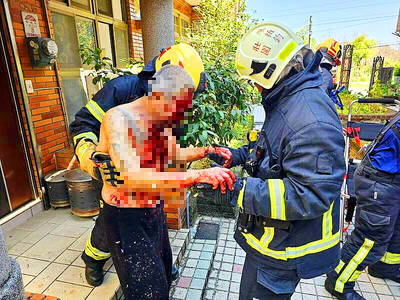Several National Taiwan University professors yesterday criticized the government’s efforts to crack down on food safety violations, saying that the snowballing recycled waste oil scandal highlights a lack of inter-ministerial cooperation and the ineffectiveness of the food safety management system.
Their remarks came one day after the Food and Drug Administration (FDA) released the results of laboratory tests that found the edible lard oil manufactured by Greater Kaohsiung-based Chang Guann Co (強冠企業), which included recycled waste oil collected from restaurant fryers, met legal standards.
“The oil scandal pertains to three ministries: the Ministry of Economic Affairs, which governs factory registration; the Environmental Protection Administration [EPA], which regulates ordinary business waste such as waste cooking oil; and the Ministry of Health and Welfare, which manages edible oil products,” Institute of Environmental Health professor Chen Chia-yang (陳家揚) told a news conference in Taipei.

Photo: CNA
Restaurants that produce waste cooking oil are legally required to inform the EPA about the firms they hire to recycle their oil and the amount that is taken away on each trip, while the recycling companies must submit records on the types and quantity of oil they handle to the economic affairs ministry.
Chang Guann allegedly used waste oil provided by Kuo Lieh-cheng (郭烈成), the owner of an unlicensed factory in Pingtung County, who is believed to have purchased the oil from waste recycler Hu Hsin-te (胡信德), Chen said.
“If the EPA and Ministry of Economic Affairs had cross-checked their records, they should have had no trouble spotting companies that sold or purchased abnormal amounts of the waste oil,” Chen said.
Reducing risks to food safety is not just a job for the FDA, it requires a concerted effort by all relevant government agencies, Chen said.
Wu Kuen-yuh (吳焜裕), a professor at the Institute of Occupational Medicine and Industrial Hygiene, said the reason the FDA’s standard lab tests have detected so few problems in the current and previous food scandals is because the government only regulates 800 kinds of food additives and chemicals when there are more than 70,000 being used nationwide.
“In addition, the failure of police investigators to notify the FDA and local health departments the minute they discovered the [alleged] illegal sales of waste cooking oil and the decision to wait four months to do so underlines the lack of cooperation and coordination between agencies,” Wu said.
College of Public Health dean Chen Wei-jen (陳為堅) said that if the government is serious about eliminating illegal practices in the food industry, it should increase the number of random, unannounced inspections of food manufacturers, rather than relying on the companies’ self-monitoring.

A total lunar eclipse coinciding with the Lantern Festival on March 3 would be Taiwan’s most notable celestial event this year, the Taipei Astronomical Museum said, urging skywatchers not to miss it. There would be four eclipses worldwide this year — two solar eclipses and two lunar eclipses — the museum’s Web site says. Taiwan would be able to observe one of the lunar eclipses in its entirety on March 3. The eclipse would be visible as the moon rises at 5:50pm, already partly shaded by the Earth’s shadow, the museum said. It would peak at about 7:30pm, when the moon would

DEFENSE: The US should cancel the US visas or green cards of relatives of KMT and TPP lawmakers who have been blocking the budget, Grant Newsham said A retired US Marine Corps officer has suggested canceling the US green cards and visas of relatives of opposition Taiwanese lawmakers who have been stalling the review of a proposed NT$1.25 trillion (US$39.7 billion) special defense budget. The Executive Yuan has proposed the budget for major weapons purchases over eight years, from this year to 2033. However, opposition lawmakers have refused to review the proposal, demanding that President William Lai (賴清德) first appear before the Legislative Yuan to answer questions about the proposed budget. On Thursday last week, 37 bipartisan US lawmakers sent a letter to Legislative Speaker Han Kuo-yu (韓國瑜), the heads

A New York-based NGO has launched a global initiative to rename the nation’s overseas missions, most of which operate under the name "Taipei," to "Taiwan Representative Office (TRO)," according to a news release. Ming Chiang (江明信), CEO of Hello Taiwan, announced the campaign at a news conference in Berlin on Monday, coinciding with the World Forum held from Monday through Wednesday, the institution stated in the release. Speaking at the event, Democratic Progressive Party Legislator Huang Jie (黃捷) said she believed this renaming campaign would enable the international community to see Taiwan

Two siblings in their 70s were injured yesterday when they opened a parcel and it exploded, police in Yilan said, adding the brother and sister were both in stable condition. The two siblings, surnamed Hung (洪), had received the parcel two days earlier but did not open it until yesterday, the first day of the Lunar New Year holiday in Taiwan, police said. Chen Chin-cheng (陳金城), head of the Yilan County Government Police Bureau, said the package bore no postmark or names and was labeled only with the siblings’ address. Citing the findings of a